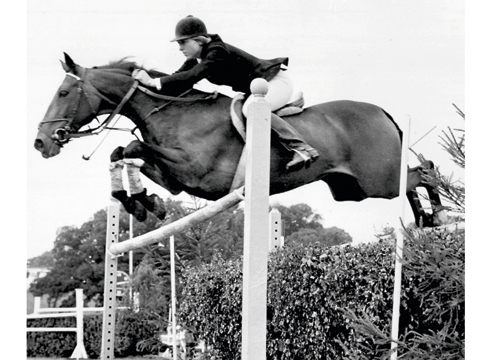He was the smallest — and among the greatest. He was a TV star whose fans wrote to ask for hairs from his tail.
Bought as a junior show jumping pony for a Hampshire farmer’s daughter, Marion Coakes, the amazing Stroller’s rise to international fame summed up every schoolgirl rider’s dream.
Stroller was imported as a “job-lot” from Ireland by the Sussex dealer Tommy Grantham. The pony went to Ted Cripps, a butcher, for his daughter, Sally.
Mr Cripps soon realised that he owned a good jumping pony. At the end of the 1960 Horse of the Year Show, Ted sold the pony as an eight-year-old to Ralph Coakes, a shrewd horseman who farmed near New Milton, Hampshire, and trained his children to show jump superbly.
Marion followed her two elder brothers, John and Douglas, into the British junior show jumping team.
She was an outstanding natural rider — this proved to be the key to unlock Stroller’s incredible abilities and they forged a fabulous partnership.
“When I came out of juniors at 16, Dad wanted to sell Stroller. It seemed the natural thing to graduate to horses, ” Marion recalls. “Ann Moore tried him, and I pleaded with Dad not to sell him, but to let me start open jumping with him.”
It became a show jumping sensation that a child’s bay pony was soaring over big spreads, parallels, banks and ditches better than most of the world’s great horses.
When she was 18 in 1965, Marion rode Stroller to triumph in the ladies’ World Championship at Hickstead.
They beat formidable opposition in a gruelling three-day contest. That year, Marion and Stroller captured the Queen Elizabeth Cup at the Royal International, and won it again six years later.
Stroller, at just over 14.2hh, was of pony height, but in conformation and temperament he was a miniature, quality horse. He had immense courage and self-confidence.
Stroller’s last puissance class was at the Antwerp show in 1967. He cleared the wall at 6ft 8in, and only put a brick out at 6ft 10in, to win jointly with Alwin Schockemöhle on Athlet, a great puissance specialist.
In his second season as a senior show jumper, Stroller helped Britain to win three Nations Cups, and the President’s Cup, the World Championships for teams.
Stroller and Marion won the Hickstead Derby Trial in 1964, and nearly captured the Derby itself, finishing second to the great Seamus Hayes and Goodbye.
Three years later Stroller was the Derby victor: he was the only one out of 44 starters to achieve a clear round, keeping his feet in a stumble and slither down the big Bank.
Stroller was second in the Hickstead Derby in 1968, and third in 1970, that year achieving an astounding victory in Germany’s formidable Hamburg Derby.
Marion recalled: “When we sailed over the last fence, having completed the only clear round of the day, the crowd of 25,000 went crazy. It was one of the most exciting moments of my life. We had completed the 50th clear round ever achieved on the course — and it was the first by a woman rider.”
Stroller’s greatest triumph, and near tragedy, was in the 1968 Mexico Olympics. There were altitude problems, but Stroller was also suffering a decayed and split upper tooth. It was decided to give him painkillers and steam inhalations rather than risk an extraction just before the contest.
Despite this, Stroller bravely jumped clear in the first round of the individual contest, and picked up eight faults in the second round over a huge course. America’s Bill Steinkraus and Snowbound took the gold medal with four faults, and Marion won the silver medal. She was feted on her return to Britain and named Sportswoman of the Year.
Troubled by his bad tooth, in the Olympic team class Stroller put in the only refusal of his life, fell after a second refusal, and was eliminated on time.
The amazing pony recovered and was so consistent that he won the Wills Hickstead gold medal for points gained in major classes, consecutively, from 1967-69. He was leading show jumper of the year at the Horse of the Year Show in 1970, and won Hickstead’s British Championship in 1971, 11 years after he appeared at the first Hickstead show in the Grasshopper Stakes, finishing sixth.
Retired in the 1970s, Stroller lived until the age of 36. He is remembered with great affection by generations of horsemen. The mass TV audience made an idol of a pony with an easy-to-remember name bearing no commercial pre-fix — one lesson British show jumping forgot.
First published in Horse & Hound in September 2003



